 W
WA harvest festival is an annual celebration that occurs around the time of the main harvest of a given region. Given the differences in climate and crops around the world, harvest festivals can be found at various times at different places. Harvest festivals typically feature feasting, both family and public, with foods that are drawn from crops that come to maturity around the time of the festival. Ample food and freedom from the necessity to work in the fields are two central features of harvest festivals: eating, merriment, contests, music, and romance are common features of harvest festivals around the world.
 W
WThis is a list of harvest festivals around the world. A harvest festival is an annual celebration which occurs around the time of the main harvest of a given region. Given regional differences in climates and crops, harvest festivals can be found at various times throughout the world.
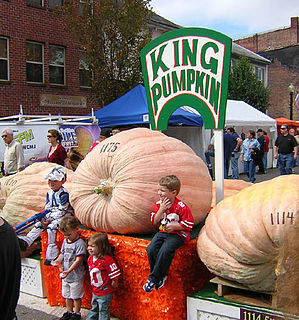 W
WThe Barnesville Pumpkin Festival is an annual festival in Barnesville, Ohio, dedicated to the growing and harvesting of pumpkins and other fall harvests. The festival, which has been held since 1964, is conducted by a locally appointed committee and attracts an average of 100,000 people during the 4 day event.
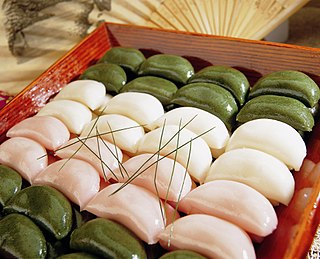 W
WChuseok, also known as Hangawi, is a major mid-autumn harvest festival and a three-day holiday in South Korea celebrated on the 15th day of the 8th month of the lunar calendar on the full moon. In North Korea, they only celebrate for the day of chuseok. Like many other harvest festivals around the world, it is held around the autumn equinox, i.e. at the very end of summer or in early autumn. It is the biggest traditional holiday in South Korea.
 W
WThe Dinamulag Festival also known as the Zambales Mango Festival is an annual festival held in the province of Zambales in the Philippines to celebrate or encourage bountiful harvest of the province's mangoes. The festival was first held in 1999. The mascot is a mango.
 W
WPrzesmyki is a village in Masovian Voivodeship, near Siedlce, eastern Poland. It is the seat of the administrative district Gmina Przesmyki.
 W
WDożynki is a Slavic harvest festival. In pre-Christian times the feast usually fell on the autumn equinox, in modern times it is usually celebrated on one of the Sundays following the end of the harvest season, which fall on different days in different regions of Europe.
 W
WThis is a list of harvest festivals around the world. A harvest festival is an annual celebration which occurs around the time of the main harvest of a given region. Given regional differences in climates and crops, harvest festivals can be found at various times throughout the world.
 W
WFesta da Uva is a celebration of Italian heritage and culture held biennially in Caxias do Sul, Rio Grande do Sul, in southern Brazil. The Festa da Uva is held in February of every even-numbered year. During the Festa da Uva, the Caxias do Sul pavilions host attractions mainly from South America, but also from other regions of the world. Visitors taste cheese, grapes and various Brazilian wines. The large crowds also draw independent vendors who promote local-themed products from the southern gaúcho state.
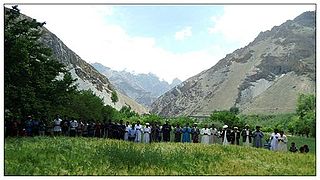 W
WGinani is an annual crop harvesting festival celebrated in valleys of Hunza and Nagar, Pakistan. It takes place on the 21st of June—the longest day of the year.
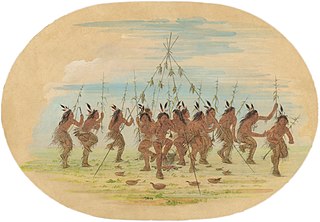 W
WThe Green Corn Ceremony (Busk) is an annual ceremony practiced among various Native American peoples associated with the beginning of the yearly corn harvest. Busk is a term given to the ceremony by white traders, the word being a corruption of the Creek word puskita (pusketv) for "a fast". These ceremonies have been documented ethnographically throughout the North American Eastern Woodlands and Southeastern tribes. Historically, it involved a first fruits rite in which the community would sacrifice the first of the green corn to ensure the rest of the crop would be successful. These Green Corn festivals were practiced widely throughout southern North America by many tribes evidenced in the Mississippian people and throughout the Mississippian Ideological Interaction Sphere. Green Corn festivals are still held today by many different Southeastern Woodland tribes. The Green Corn Ceremony typically occurs in late July–August, determined locally by the ripening of the corn crops. The ceremony is marked with dancing, feasting, fasting and religious observations.
 W
WGuldize, Gooldize is the harvest festival of the Cornish people. Guldize is an anglicization of Cornish Gool dheys "the feast of ricks". The festival was held at the end of the wheat harvest and took the form of a vast feast usually around the time of the autumnal equinox. The ceremony of Crying The Neck took place before the feast, the neck being formed into a Corn dolly, which presided over the celebrations. Since 2008 a revived Guldize celebration has been held in Penzance and since 2010 in several other locations across Cornwall.
 W
WThe Half Moon Bay Art and Pumpkin Festival is an annual festival held in the coastside community of Half Moon Bay, California for one weekend during pumpkin harvest season. It is one of the oldest and largest local festivals in California. Proceeds go to local civic causes and to the beautification of the downtown area of Half Moon Bay. There is no admission charge for the event.
 W
WThe Harvest Festival of Thanksgiving is a celebration of the harvest and food grown on the land in the United Kingdom. It is about giving thanks for a successful crop yield over the year as winter starts to approach. The festival is also about giving thanks for all the good and positive things in our lives such as family and friendships. Harvest Festivals have been traditionally held in churches but also in schools and sometimes in pubs. Some estates and farms used to hold a harvest festival in a barn. In some towns and villages the harvest festivals are set so that the different churches do not have it on the same day. People bring in produce from their garden, allotment or farm. Often there is a Harvest Supper when some of the produce is eaten. Typically surplus produce is given away to a local charity, hospital or children's home or auctioned for charity.
 W
WIncwala is the main ritual of kingship in the Kingdom of Eswatini. This is a national event that takes place during the summer solstice. The main participant in incwala is the King of Eswatini; when there is no king there is no incwala. Incwala takes place over a period of time of about a month, starting with the small incwala, incwala lencane, and culminating in the big incwala, incwala lenkhulu. A number of activities—such as lusekwane, kuhlamahlama, and umdvutjulwa—mark the key events of this age old tradition.
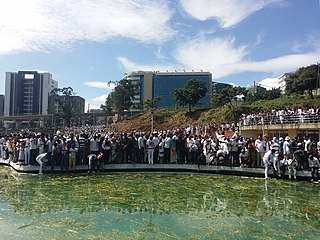 W
WIrreecha, is thanksgiving holiday celebrating the end of the winter in Oromia Region, Ethiopia. The Oromo people celebrate Irreecha to thank Waaqa (God) for the blessings and mercies they have received throughout the previous year. The Irreecha festival is celebrated every year at the beginning of Birraa (Spring), new season after the dark and rainy winter season. It is attended by hundreds of thousands people. The thanksgiving is celebrated at sacred lakes across Oromia and Hora Harsadi, Bishoftu, Oromia as a whole. Once at the lake, festival-goers immerse freshly cut green grass and the flowers they are carrying and sprinkle themselves and place in water.
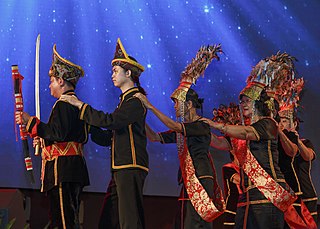 W
WKaamatan or Pesta Kaamatan is a form of harvest festival celebrated annually in the state of Sabah in Malaysia. It is normally celebrated by the ethnic Kadazan-Dusuns, as well as by other related ethnic groups in the state, and lasts for the whole of the month of May, ending with a public holiday on a date selected by a priestess known as the bobohizan.
 W
WThe Kadayawan Festival is an annual festival in the city of Davao in the Philippines.
 W
WKaram is a harvest festival celebrated in Indian states of Jharkhand, Bihar, Madhya Pradesh, Chhattisgarh, Assam, Odisha and West Bengal. It is dedicated to the worship of Karam-Devta (Karam-Lord/God), the god of power, youth and youthfulness. The Karam festival celebrated by diverse groups of people, including: the Kharia, Korba, Kuli/Kulis, Bagal, Baiga, Binjhwari, Bhumij, Oraon, Munda, Santal, Kudmi, Karmali, Lohra and many more. The festival is held on the 11th day of a full moon (Purnima) of the Hindu month of Bhado (Bhadra), which falls between August and September. Groups of young villagers go to the jungle and collect wood, fruits, and flowers. These are required during the puja (worship) of the Karam God. During this period, people sing and dance together in groups. The entire valley dances to the drumbeat "day of the phases".
 W
WMakar Sankranti or Uttarayan or Maghi or simply Sankranti, also known in Bangladesh as Poush Sankranti, is a festival day in the Hindu calendar, dedicated to the deity Surya (sun). It is observed each year the day Sun enters the Capricorn zodiac which corresponds with the month of January as per the Gregorian calendar. It marks the first day of the sun's transit into Makara rashi (Capricorn).
 W
WThe Mid-Autumn Festival, also known as the Moon Festival or Mooncake Festival, is a traditional festival celebrated in mainland China, Taiwan, Hong Kong, Macau, and Vietnam, as well as by overseas Chinese and Vietnamese communities. Similar holidays are celebrated in Japan, Korea, and throughout Southeast Asia.
 W
WThe Ongkor Festival is one of most important Tibetan festival of the Tibetan lunar year. Ongkor is usually held at the end of summer. The meaning of the festival's name is "good wishes for harvest", literally "making a circle around the field". During this festival, one person from each family in the village participates in kora in the fields. People in the procession dress in traditional clothes and play different roles—warriors, riders, drummers, those praying, or monks. In some regions Tibetan opera, dancing to drums and horse racing are performed. During this festival, many different aspects of traditional Tibetan culture are shown, including singing, dancing, the art of debate, dressing and praying.
 W
WPahela Baishakh is the first day of the Bengali calendar which is also the official calendar of Bangladesh. This festival is celebrated on 14 April in Bangladesh and 15 April in the Indian states of West Bengal, Tripura, and Assam by Bengalis regardless of religious faith.
 W
WThe Pangkak is a traditional Kangeanese rice harvest festival tradition and ceremony. Kangeanese people believe the pangkak ceremony is a pure spiritual form and a sign of gratitude for the natural products of agriculture towards God in return for a successful harvest.
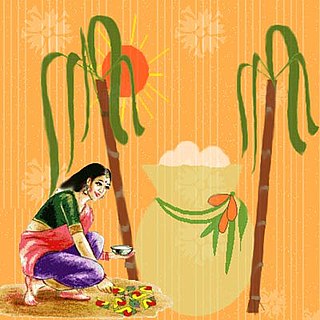 W
WPongal, is also referred to as Thai Pongal, is a multi-day Hindu harvest festival of South India and Srilanka, particularly in the Tamil community. It is observed at the start of the month Tai according to Tamil solar calendar, and this is typically about January 14. It is dedicated to the Hindu sun god, the Surya, and corresponds to Makar Sankranti, the harvest festival under many regional names celebrated throughout India. The three days of the Pongal festival are called Bhogi Pongal, Surya Pongal and Maattu Pongal. Some Tamils celebrate a fourth day of Pongal as Kanum Pongal.
 W
WPukllay or phukllay is a traditional festival held in the central Andes. The word "play" refers to either the clouds or the blossoms "playing" in the winds at the end of the rainy season and thus harvesting time. The Bolivian Pukllay is connected to the Christian carnival and the celebration of a battle won over the Spaniards – hence the appropriation of the Spanish helmets and spurs one can still see in the ritual dance.
 W
WSeren Taun is an annual traditional Sundanese rice harvest festival and ceremony. The festival was originally held to mark the new agriculture year in the Sundanese ancient calendar as well as thanks giving for the blessings of the abundance rice harvest, and also to pray for the next successful harvest. Seren Taun demonstrates the Sundanese agricultural way of life, and is held in high regard in Sundanese traditional villages, as the festival draw thousands Sundanese villagers to participate as well as Indonesian or foreign visitors.
 W
WSharad Purnima is a harvest festival celebrated on the full moon day of the Hindu lunar month of Ashvin, marking the end of the monsoon season. On this auspicious day, many divine pairs like Radha Krishna, Shiva Parvati, and Lakshmi Narayan are worshipped along with the moon and are offered flowers and kheer. Deities in temples are usually dressed in white color signifying the brightness of moon. Many people observe full day fasting on this day.
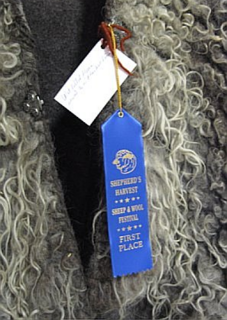 W
WMinnesota's Shepherd's Harvest Festival is the largest sheep and wool festival in Minnesota.
 W
WSukkot, is a Torah-commanded holiday celebrated for seven days from the 15th day of the month of Tishrei. It is one of the Three Pilgrimage Festivals on which those Israelites who could were commanded to make a pilgrimage to the Temple at Jerusalem.
 W
WNueva Ecija, the largest province in Central Luzon, is a historic province with colorful and remarkable festivals. This province, with 5 cities and 27 municipalities, has diverse cultural traditions that became significant part of Novo Ecijanos culture and tradition.
 W
WThanksgiving is a national holiday celebrated on various dates in the United States, Canada, Grenada, Saint Lucia, and Liberia. It began as a day of giving thanks and sacrifice for the blessing of the harvest and of the preceding year. Similarly named festival holidays occur in Germany and Japan. Thanksgiving is celebrated on the second Monday of October in Canada and on the fourth Thursday of November in the United States and around the same part of the year in other places. Although Thanksgiving has historical roots in religious and cultural traditions, it has long been celebrated as a secular holiday as well.
 W
WTsukimi or Otsukimi (お月見), meaning, "moon-viewing", also known as Jugoya (十五夜), are Japanese festivals honoring the autumn moon, a variant of the Mid-Autumn Festival. The celebration of the full moon typically takes place on the 15th day of the eighth month of the traditional Japanese calendar; the waxing moon is celebrated on the 13th day of the ninth month. These days normally fall in September and October of the modern solar calendar.
 W
WUmkhosi Wokweshwama [um̩kʰoːsi woɠʷeʃʷaːma], recently also known as Umkhosi Woselwa [um̩kʰoːsi woseːlʷa], is the annual harvest festival of the Zulu people, observed around the December solstice. It takes place at the Enyokeni Royal Palace in Nongoma, KwaZulu-Natal, and is presided over by the Zulu King, who conducts a tasting ceremony as sacred king, closed by the dashing of a calabash to signify that the people may now enjoy the fruits of the harvest; this role was historically expanded by Shaka to have more military significance with a muster and parade. It was revived by the current king's father, the late King Goodwill Zwelithini kaBhekuzulu in 1990, after a ban by British colonial authorities following the 1879 Battle of Isandlwana and Zulu defeat in the Anglo-Zulu War.
 W
WVaisakhi, also pronounced Baisakhi, marks the first day of the month of Vaisakha and is usually celebrated annually on 13 or 14 April as the solar new year. It is additionally a spring harvest festival in the Punjab.
 W
WWangala is also called the festival of "The Hundred Drums", a harvest festival celebrated by the Garo tribe, who live in Meghalaya, Nagaland and Assam in India and Greater Mymensingh in Bangladesh. In this post harvest festival, they give thanks to Misi Saljong the sun god, for blessing the people with a rich harvest. Wangala is celebrated in the months from September to December, with different villages setting different dates for the occasion.